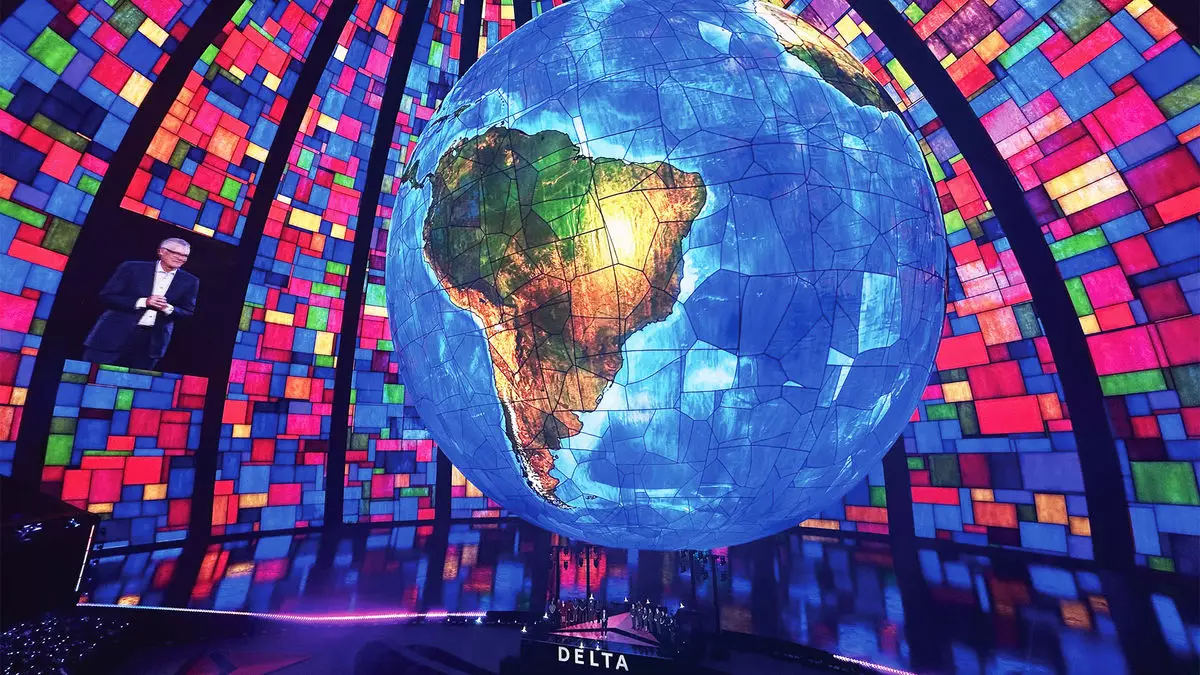Air travel, a ubiquitous facet of modern life, is on the cusp of a technological renaissance. At the Consumer Electronics Show (CES) in Las Vegas, Delta Air Lines CEO Ed Bastian delivered a compelling keynote that underscored the airline’s vision of evolving into a forward-looking technology powerhouse. His address not only illustrated Delta’s strategic ambitions but also reflected the airline’s commitment to transforming air travel experiences through advanced technology, artificial intelligence, and personalization.
During his keynote at the Sphere, an innovative venue noted for its immersive displays, Bastian painted a vivid picture of a future where Delta airplanes could be viewed as destinations in themselves. “There is much more we can and will be doing in the years ahead to personalize your experience,” he declared. This vision is not merely aspirational but is indicative of Delta’s aggressive strategies to incorporate technology at every stage of the travel journey.
Central to Bastian’s vision was the unveiling of Delta Concierge, a groundbreaking new app feature set to launch this year. This AI-driven tool aims to create a comprehensive, personalized travel experience that addresses all customer needs—from proactive notifications regarding visa requirements to real-time navigational assistance in airports. By focusing on the entire travel lifecycle, from departure to arrival, Delta seeks to redefine convenience and personalization in air travel.
Integrating AI for Seamless Travel
Bastian elaborated on how Delta Concierge would fundamentally reshape interactions with air travel. For example, imagine a business traveler heading to Tokyo receiving timely alerts about traffic conditions that could impact her journey to the airport. With a mere voice command, she could explore alternative transport options, possibly even from Delta’s electric air taxi partner, Joby Aviation. This fluid integration of AI into both travel planning and real-time adjustments signifies a turning point in the industry.
The anticipated biometric rollouts aimed at creating a hands-free airport experience further illustrate Delta’s commitment to the future. By eliminating the need for physical IDs at key checkpoints, Delta envisions a travel environment where efficiency reigns supreme. This would not only streamline the travel process but could also significantly enhance security measures.
Onboard, the Delta Concierge feature is poised to elevate the in-flight experience. Picture a scenario where your personal preferences are recognized and accommodated with minimal effort. Ranjan Goswami, Delta’s senior vice president for customer experience design, explained that the system could recall previous orders, such as a favorite cocktail, and prompt the traveler when appropriate. This level of personalized service can ensure that flying feels less transactional and more like a curated experience.
Additionally, the innovations extend beyond customer service. Delta’s entertainment system, Delta Sync, is being upgraded to enhance the way passengers experience in-flight media. The system’s ability to suggest content based on viewing history, along with new capabilities scheduled for 2026, such as do-not-disturb notifications for cabin crew and Bluetooth pairing, will elevate passenger engagement. A 50-fold increase in system capacity means an array of options for entertainment, ensuring that every journey is mapped out for enjoyment.
A Vision for Tomorrow
Delta’s expanded capabilities in personalization are set to change the paradigm of air travel in both subtle and substantial ways. The planned enhancements to Delta Sync, including a cloud-based system that allows for real-time updates to the entertainment catalog, illustrate a fundamental shift in how airlines can maintain and improve their offerings consistently. No longer will passengers be confined to outdated content; Delta will provide fresh, relevant material that can be adapted based on passenger preferences.
As we look towards the future, it’s clear that Delta’s ambitions extend beyond traditional expectations of what an airline should be. By harnessing technology and AI, Delta seeks to create a seamless, integrated travel experience that begins long before passengers arrive at the airport. The airline is not just boarding the technology train; they are driving it forward, challenging the norms of the aviation industry and positioning themselves as leaders in the transformation of travel.
Ultimately, as Delta continues to innovate and evolve, air travel will become easier, more intuitive, and incredibly tailored, paving the way for a new era where personalization and efficiency lead the journey. This ambitious outlook not only bodes well for Delta’s future but indicates a seismic shift in how we perceive and experience flying, reaffirming the airline’s commitment to its passengers and pioneering travel innovation.


Leave a Reply